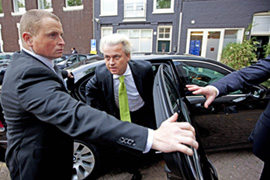Gambling with Geert Wilders
Far-right Dutch MP could become an attractive coalition partner after the June 9 poll.

He is easy to pick out in a crowd. He is tall, with his dyed blond hair swept back; he carries a patrician air which is slightly diminished by the white tracksuit top he wears emblazoned with his Freedom Party’s initials, the PVV.
The fact that he is constantly surrounded by bodyguards, a legacy of the numerous death threats against him, makes him that bit more noticeable.
Geert Wilders is loved by some, loathed by others but rarely ignored.
Before his arrival in the town of Spijkenisse, a 90 minute drive from Amsterdam, there is a buzz of excitement. He is, after all, one of the best known figures in the Netherlands.
Suddenly there is a shout as he emerges, walking through the weekly market, stopping to shake hands and pose for pictures. Ahead his party workers, clad in the same white tops, pave the way, handing out pictures of their leader.
Free speech
The 47-year-old began his political career as a speech writer for the right of centre Dutch Liberal Party, the VVD. He was elected as an MP in 1998, but split with his party because of its support for Turkish entry into the EU.
His profile increased dramatically in 2004, following the murder of filmmaker Theo Van Gogh by a radical Islamist. Van Gogh had produced a controversial short film called Submission which featured an actress in see-through clothing with Quranic script on her body.
Even though he had no involvement in the film, overnight Wilders’ security was increased, with a permanent protection team assigned because of his outspoken views on Islam.
Last year, the British government tried to ban him from the UK on the grounds that he posed a threat to public security. The decision provoked outrage among supporters of free speech and the ban was later overturned by the courts.
Later in the year he returned to show his controversial movie Fitna – roughly translated as ‘strife’ in Arabic – which links the Quran to terrorism.
Politically, Wilders scored his biggest success in the 2006 Dutch general election when his party picked up nine seats.
Now, he could be on the verge of a big political breakthrough. The latest polls suggest that with his strong anti-immigration message, he could win up to 20 seats in the country’s June 9 election. This would put him in a strong position to be included in any right leaning coalition government if, as expected, the Liberals top the poll.
‘Red lines’
 |
| Wilders was assigned a permanent protection team after the murder of Theo Van Gogh [EPA] |
As he makes his way around the market, I manage to push my way through the local media and almost past the security with their permanently attached earpieces, smart suits and bulky jackets.
I introduce myself but cannot get close enough to shake hands. He stops. And people gather around wondering what he is about to say.
I ask about the polls. He tells me: “We are on course for a very good result. We hope to govern. We can achieve more if we govern but we will have many more MPs.”
His security team would like to move on – but having the Netherland’s most controversial politician face-to face is too good a chance to pass up.
I ask what a good performance will mean for the minority communities and the Muslims across the country. The answer is well rehearsed.
“We want less Islamisation. We want to stop immigration. For the people here, they have nothing to fear as long as they abide by our laws, but we want to stop the Islamisation of Europe and of our country.
“We are not against the people but we are against Islam which is a fascist ideology. We have red lines. If you don’t abide by our laws, with our way of life, we will do what we can to remove you. We have to protect our society, the Dutch way of life.”
Curbing immigration
Wilders was riding high in the polls in March, when in local elections his party won the most seats on two councils. But as the economy has grown to dominate the election, and other parties have followed with measures to curb immigration, some of the life has been sucked out of the campaign.
His critics say he identifies what he sees as problems but never offers solutions. Asked to offer some, he says he has identified that immigration costs the Netherlands more than $8bn a year. He insists curbing it would save the country money.
And then he is off, moving through the crowd, kissing babies, smiling widely and acknowledging the odd cheer.
As he makes his way through a shopping centre, I see a man collect his picture from a party worker, throw it to the ground and stamp on it. One young shop assistant gives the thumbs down as he walks by. I catch her eye and she smiles, almost embarrassed to have been caught.
As he leaves town, on the way to his next campaign stop, he is handed a bunch of flowers by a party worker. It is a moment staged for the cameras. He smiles, gets in the back seat of his large car, and he is off.
A big gamble
Even though he will appear in court later this year on race hate charges because of his comments about Islam there are many here who support him and his policies.
One middle aged couple tell me they were pleased to shake his hand. “Many people will not say they support Wilders. They are scared. People call them racist. We are not racist.
“This country has problems and he has the answers.”
But one man who was born in Turkey but has lived in the Netherlands for 50 years is angry Wilders came to town. In a reference to where the politician’s mother was born, he tells me: “Wilders is one half Indonesian and one half Satan. He is trying to divide the country.”
For so long the political outsider, his electoral support could make Geert Wilders a very attractive coalition partner. But it would be a big gamble for any mainstream party to welcome the Netherland’s most divisive politician and his views into government.